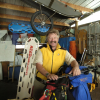Submitted by Carl Weil on

TWO Lessons- watch rotor blades they droop up to 6 feet! YOU may be injured but have to still give care! read the following story---
July 10 2012
Hiker awaiting help for broken leg ends up rescuing his rescuer

A hiker stranded by a broken leg in a remote part of California's Shasta-Trinity National Forest acted as a doctor first, and a patient second, when the paramedic who flew in to rescue him last week was struck in the head by a helicopter blade.
Dr. Jeremy Kilburn, an Air Force pulmonologist from Las Vegas, was hiking with a friend in a rugged section of the park near Big Bear Lake when he broke his leg and injured his ankle, according to the California Highway Patrol. The Highway Patrol sent two officers in a medevac to the area.
But when Officer Brian Henderson and paramedic Officer Tony Stanley arrived, the mission took an unexpected turn, one that would require Kilburn -- who had served as a trauma surgeon in Afghanistan -- to draw on his medical training.
Henderson turned off the helicopter's rotor blade when they landed. Stanley got out, but stayed close to the chopper.
"The blade was slowing, but it was still moving," CHP spokesman Lt. Scott Fredrick told msnbc.com.
As the rotors slowed, the blade sagged, and slammed Stanley in the back of the head. He collapsed, unconscious, instantly. Blood was coming from his shattered skull.
Kilburn did not return requests for an interview from msnbc.com. But Dan Grasso, Kilburn's lifelong friend and hiking partner, described last Thursday's hike for the first time on Monday to The San Jose Mercury News.
"I knew that for him (Stanley) to have a chance of surviving, I would have to get Jeremy to him," Grasso, of Sunnyvale, Calif., told the paper.
Grasso helped Kilburn hop 50 yards down the hill, where Kilburn hooked Stanley up to oxygen and put pressure on his wound, Grasso told The Mercury News.
"Thanks to the assistance they provided, Tony is alive today," CHP Commissioner Joe Farrow said in a press release. "I cannot even imagine the pain Dr. Kilburn was in, unable to walk ... Without regard to his own injuries and pain, Dr. Kilburn performed critical life-saving steps."
Kilburn's leg was injured when his German shepherd, who had joined them for the hike, bumped into him, causing him to land awkwardly, the CHP spokesman said. Grasso borrowed radios to call for help from two camp counselors who were hiking with kids in the area; the counselors, Elizabeth Fitch and Bryce Halbert, helped load Stanley into the chopper with Kilburn.
The pilot asked Fitch to be a flight nurse, CHP said. Kilburn directed her to hold IV bags for Stanley and help control his bleeding throughout the 40-mile-plus journey back to Redding, Calif., for hospitalization.
Meanwhile, Grasso, the remaining camp counselor, and a dozen kids hiked back down on foot, said The Mercury News.
Stanley, 40, has worked for the California Highway Patrol for 10 years. Lt. Fredrick told msnbc.com on Tuesday that Stanley was still hospitalized at Mercy Medical Center and being treated for his wounds.
Grasso told The Mercury News that Kilburn doesn't see himself as a hero for keeping Stanley alive.
"He says, 'That's my job, I do this every day,'" he said. "That's for him to say. The rest of us will still call him a hero."
Kilburn is recovering and has returned to assignment with the Air Force in Las Vegas, CHP spokesman Fredrick said.
